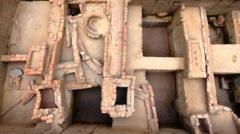Archaeologists recently unearthed a significant mass grave beneath a soccer field in the Simmering district of Vienna, shedding light on a period of Roman history nearly 2,000 years ago when the empire faced off against Germanic tribes. The discovery was made in October during a renovation project, and a team from the Vienna Museum has been studying the site since then. They suggest that the site may be linked to a catastrophic military defeat, with Roman soldiers hastily buried after a battle.
Radiocarbon dating indicates that the remains date back to between A.D. 80 to 234, during a tumultuous time for the Roman Empire under emperors such as Domitian and Trajan. Artifacts unearthed alongside the skeletal remains—among them an iron dagger, lance points, and pieces of armor—provide valuable context for understanding this historic moment. The unearthing of nails from distinct Roman military sandals emphasizes the military nature of this grave.
Lead anthropologist Michaela Binder noted the rarity of such finds, particularly in central Europe, as cremation predominated Roman burial practices until the third century A.D. The discovery not only offers insight into the military practices of the time but also allows for a unique examination of the lives of individuals from the first century A.D. Detailed study of these remains may yield significant contributions to our understanding of history during this era.
Radiocarbon dating indicates that the remains date back to between A.D. 80 to 234, during a tumultuous time for the Roman Empire under emperors such as Domitian and Trajan. Artifacts unearthed alongside the skeletal remains—among them an iron dagger, lance points, and pieces of armor—provide valuable context for understanding this historic moment. The unearthing of nails from distinct Roman military sandals emphasizes the military nature of this grave.
Lead anthropologist Michaela Binder noted the rarity of such finds, particularly in central Europe, as cremation predominated Roman burial practices until the third century A.D. The discovery not only offers insight into the military practices of the time but also allows for a unique examination of the lives of individuals from the first century A.D. Detailed study of these remains may yield significant contributions to our understanding of history during this era.




















